Do you think you have an aggressive or scared ferret?
How can you know the difference between those two?
Most ferrets are loving animals so if you have a scared or aggressive ferret near you, there is something in his life that triggered it. Most ferrets that show any sign of fear are abused animals often found in shelters. Having an abused animal in the household can be challenging. That is why it is very important to know how to recognize a scared or aggressive ferret and how to handle them.
TABLE OF CONTENTS
Why Is My Ferret Aggressive?
Ferrets have sharp teeth and that is a fact. They also have thick skin. Most of their communication is connected to those two things. That is why it is very important for them to spend the first few months of their life surrounded by siblings and their mother. They will communicate with biting and during those times together, they learn what they can and can’t do.
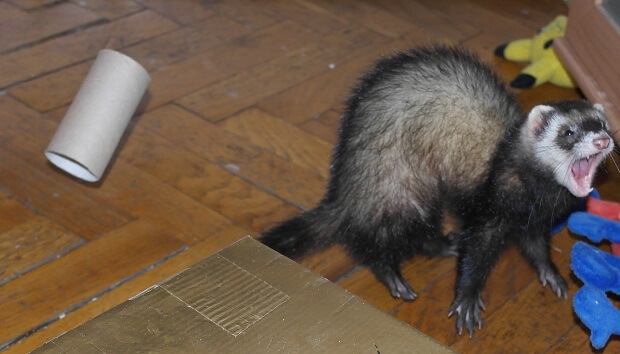
But, aggressive or scared ferrets act differently. Before you deal with an aggressive pet, you have to know the reason behind that behavior. There isn’t one specific reason that can trigger that, but more. Some of them are strictly hormonal, while others are connected to the ferret’s experience gathered through life.
Unaltered Ferret
If you have a whole male ferret you will probably experience some form of aggression during mating season. That can be towards other ferrets, even towards you. This behavior is triggered during that season because an unaltered male (also known as hob) has to show dominance. The best way to stop this aggression is to neuter your ferret. You can read all about how to do it in my post about ferrets in heat.
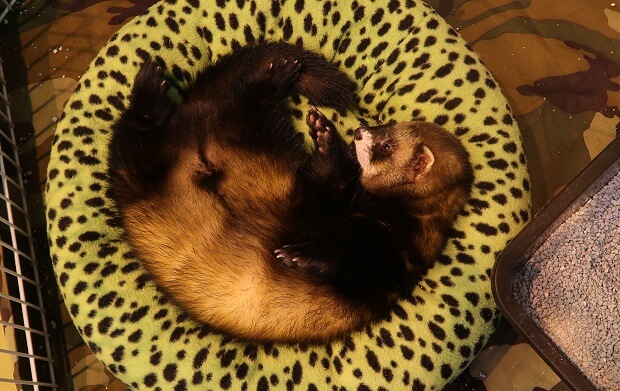
When a female ferret comes into heat, she doesn’t show aggression and she won’t try to dominate other ferrets around you. But, that doesn’t mean a female ferret can’t be aggressive or assert dominance. She can and sometimes she will. But, if that aggression is under control it is not something you should interfere with. This article handles situations where ferrets are aggressive and not in a healthy way.
Abused & Scared Ferret
The more critical reason for a ferret to be aggressive (or scared) as if he was abused at one point in life. There are cruel people who do that. If you want to rescue a ferret, keep in mind that he might have a bad experience with people.

Most abused ferrets are aggressive out of fear and if you want to handle that ferret, be patient, gentle, and don’t give up. Later in the article, we will talk about how to handle ferrets that don’t trust people. Dealing with a hormonal aggressive ferret is much easier than dealing with one that doesn’t trust you, although both options aren’t a walk in the park.
Ferret Is In Pain
If your ferret isn’t aggressive in general but that changed in the last few days, he might be in pain. Some ferrets express their discomfort and pain with aggression. Observe your ferret, hold him and cuddle with him.

If he starts biting you when you touch a certain part of his body, he might be in severe pain. If he acts strangely, sleepier than usual, or doesn’t want to eat or drink, it might be good to visit the veterinarian.
Aggression As A Personality Treat
Although most ferrets know what it means to bite too hard, there are a few ones who simply don’t care about that. They are true biters and they will bite everything and everyone that comes in the way. One in a hundred ferrets can be a true biter and that might be their nature, but that doesn’t mean you can’t handle them.
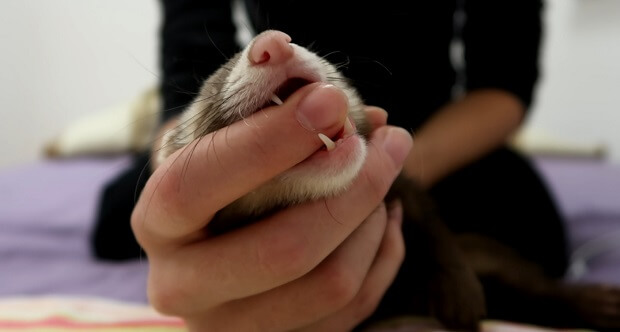
You simply have to show them that there are other ways to do things besides biting. You have to be aware that those ferrets aren’t aggressive, they simply want to bite and it is your job to show them other ways to communicate.
Signs Of Aggressive Or Scared Ferret
There are a few behavioral and physical signs that will easily show you that a ferret doesn’t feel comfortable. Even if you don’t know them, just by hearing them you can sense that something isn’t right.
Hissing Ferret
Hissing ferret is a ferret that wants to tell you not to mess with him. Most ferrets aren’t vocal so they will express themselves vocally only if they are overly excited, they want to warn you not to come near or they are angry. All those emotions are extreme so if you hear a hissing ferret, take it as a warning. If you come near a hissing ferret, don’t get surprised if he bites you.
Puffed Up Ferret
If you notice that your ferret is all puffed up (or only his tail), especially if it comes in a combination with hissing sounds, leave him alone. It is most likely scared and that can eventually lead to aggressive behavior. A ferret does that to appear bigger to the threat in front of him, in this case – you.
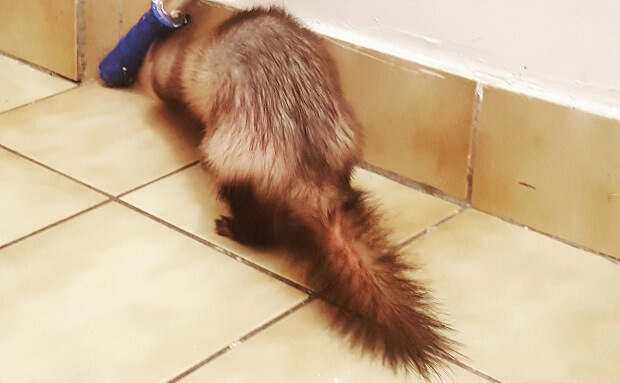
Biting Ferret
Another pretty clear sign of an aggressive fuzzy is biting. If you notice that a ferret wants to bite you, take a few steps back and think about your next move. Sometimes, the best way to handle a biting ferret is to leave it alone for a while.
Ferret In Hiding
The most obvious sign of a scared ferret is hiding. Your ferret can be startled by some noise, a new environment, or even you. Once a ferret feels threatened, he will run and hide under a table or couch. Once he feels safe again, he will pop his head out to evaluate the situation, then leave or stay in his hideout, depending on the evaluation. This behavior can also be accompanied by hissing sounds and a puffed-up tail and it is a sign of a scared ferret, not an aggressive one.
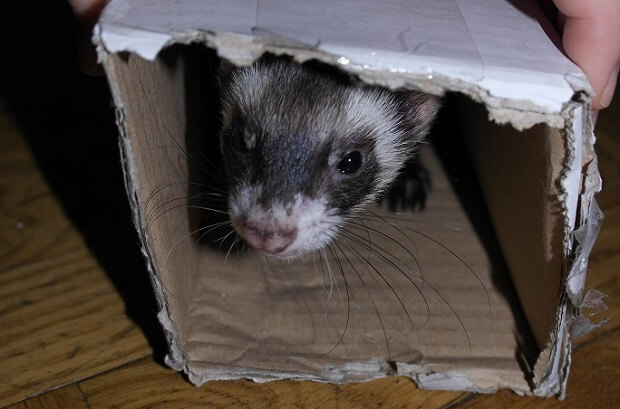
How To Handle Aggressive Or Scared Ferret?
The first thing you have to understand is that every scared animal needs time to adjust. So, don’t rush with your interaction, let your new ferret explore new surroundings. He will feel more relaxed when he knows a new territory he is in. Once he is comfortable with his surroundings, then you can start with the bonding process. Ferrets are stubborn so don’t give up even if it takes a long time to get their trust and eventually love.
Hold The Ferret
By this, I don’t mean cuddling with your ferret because that is something you can’t do with an aggressive ferret unless you want him to bite you. If you want to hold your ferret without getting bitten, you have to start with scruffing the ferret.
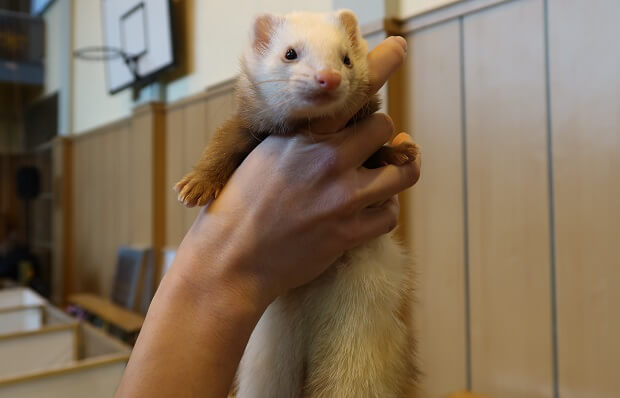
After that, use your other hand and grab the ferret gently under his arms, you can even grab his paws and put it between your fingers. This is a position where the ferret can’t bite you. Now that you hold your ferret, you can release the scruff and use that hand for gentle cuddles. This is a great way to show your ferret you don’t want to hurt him with your touch. Do it for a short period of time in the beginning.
Cuddle A Sleeping Ferret
Another thing you can do to strengthen a bond with your ferret is to trick him. If you have a sleeping ferret near you, you can try to gently pet him over his head. And if he doesn’t wake up, continue with it for a couple of minutes. If he wakes up, try to do it when he is sleepy, and if he allows it then you are in a great position to continue.
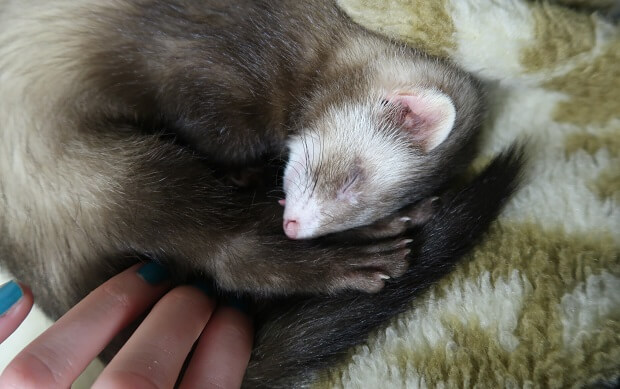
Once you break that first barrier with cuddles, you can try the same method but one step more. Try to put that sleepy ferret in your lap and continue with the same action. Gradually you can even pet your ferret when he is almost asleep so he can see what you are doing. After that, the only step you have to do is to pet him when he is completely awake.
Don’t Show Fear
Every move you make with the ferret has to be firm because you have to show that you know what you are doing. If you believe in yourself, the ferret won’t notice your doubt or fear and that will make him relaxed. When you are scared, the ferret can act accordingly and use that to his advantage. He can use that small amount of uncertainty to bite because he doesn’t want to be around you. He is probably as scared as you are, but you have to show him that it is in his best interest to start trusting you.
Don’t Use Your Hands As Toys
If you want to play with your ferret and he still doesn’t trust you completely, don’t use your hands as toys. Use toys on strings, plushies, balls, etc. I know it is fun to wrestle with your ferret, but that action is reserved with a ferret that trusts you completely.
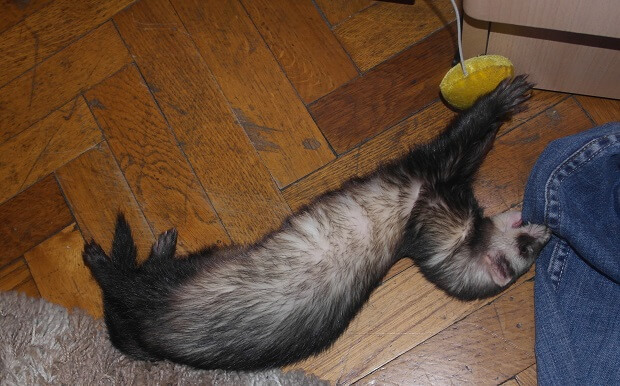
You can’t flip a ferret on his tummy and scratch him if he doesn’t trust you. I mean, you can, but you can also expect bites and scratches so I wouldn’t recommend that. When ferrets are in the playing mode, they will get overly excited and even the most gentle ones can bite. So, make sure you have your ferret’s trust before you engage in a game that includes your hands near his teeth/paws.
Do You Need Gloves To Handle A Ferret?
That decision is entirely up to you. Thick gloves will provide you protection and if you don’t feel comfortable handling a scared or aggressive ferret, then use them. It is a good idea to use them the first time, especially if you don’t know how a ferret will react. But, deciding on the type of glove is another pretty important thing.
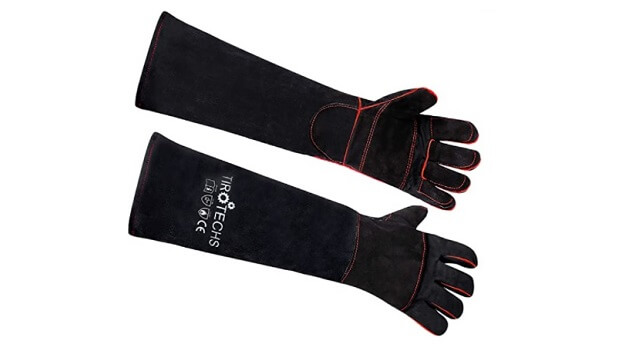
That means you shouldn’t use gloves that are too big or you might drop the ferret. You have to have a good grip on them so you can gently but safely hold a ferret in your hand. If you decide on the glove just remember that they are only a temporary solution. You can’t handle a ferret with gloves forever so make sure you decide to ditch them as soon as possible.
Conclusion
Having a scared or aggressive ferret can be a challenge, but once you turn him into a cuddle bug, you will realize that everything was worth it. The only thing you have to remember is to be patience and don’t use violence under any circumstances. Violence isn’t and it will never be a solution!




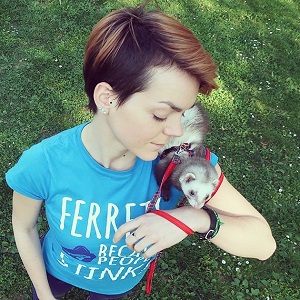


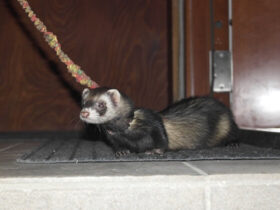









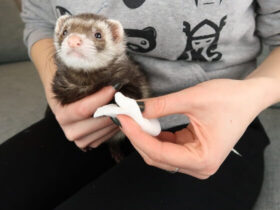
Leave a Reply